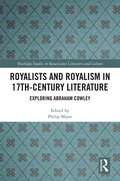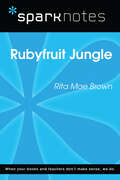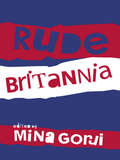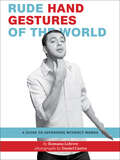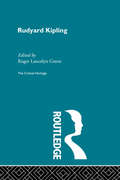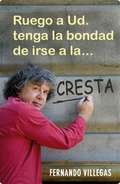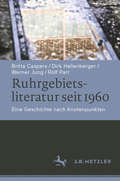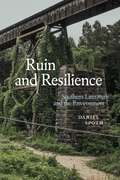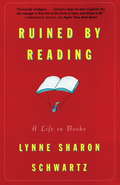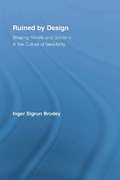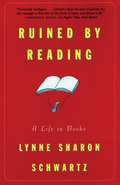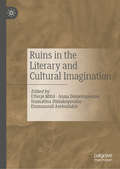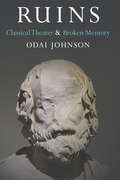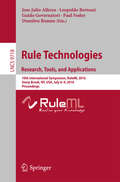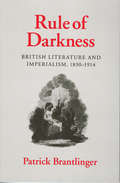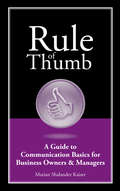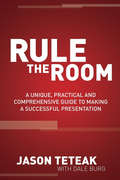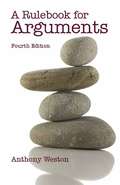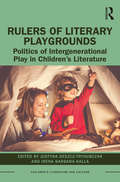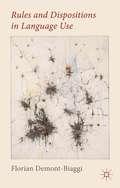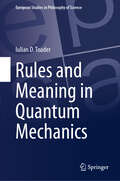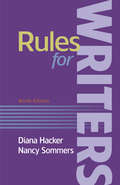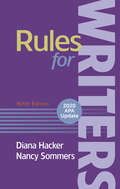- Table View
- List View
Royalists and Royalism in 17th-Century Literature: Exploring Abraham Cowley (Routledge Studies in Renaissance Literature and Culture)
by Philip MajorAuthor of plays, love-lyrics, essays and, among other works, The Civil War, the Davideis and the Pindarique Odes, Abraham Cowley made a deep impression on seventeenth-century letters, attested by his extravagant funeral and his burial next to Chaucer and Spenser in Westminster Abbey. Ejected from Cambridge for his politics, he found refuge in royalist Oxford before seeing long service as secretary to Queen Henrietta Maria, and as a Crown agent, on the continent. In the mid-1650s he returned to England, was imprisoned and made an accommodation with the Cromwellian regime. This volume of essays provides the modern critical attention Cowley’s life and writings merit.
Rubyfruit Jungle (SparkNotes Literature Guide Series)
by SparkNotesRubyfruit Jungle (SparkNotes Literature Guide) by Rita Mae Brown Making the reading experience fun! Created by Harvard students for students everywhere, SparkNotes is a new breed of study guide: smarter, better, faster. Geared to what today's students need to know, SparkNotes provides: *Chapter-by-chapter analysis *Explanations of key themes, motifs, and symbols *A review quiz and essay topicsLively and accessible, these guides are perfect for late-night studying and writing papers
Ruchira Dviteeyo Bhag class 7 - NCERT - 23: रुचिरा द्वितीयो भागः ७वीं कक्षा - एनसीईआरटी - २३
by Rashtriy Shaikshik Anusandhan Aur Prashikshan Parishadरुचिरा पुस्तक शृङ्खला अपने नाम के अनुसार रुचिवर्धक सामग्री से विद्यालय स्तर पर छात्र-छात्राओं में संस्कृत भाषा के प्रयोग में कुशलता तो प्रदान करेगी ही, साथ ही संस्कृत साहित्य के प्रति उत्सुकता एवं सम्मान भी पैदा करेगी। इसी शृङ्खला का द्वितीय पुष्प रुचिरा द्वितीयो भाग: (पुनरीक्षित संस्करण 2018) छात्र-छात्राओं के लिए प्रस्तुत है। इस पुस्तक के निर्माण में इस बात का ध्यान रखा गया है कि कक्षा में शिक्षक और विद्यार्थियों की अन्तःक्रिया प्रश्नोत्तर माध्यम से संस्कृत में ही हो, जिससे विद्यार्थी संस्कृत के सरल वाक्यों को समझने, बोलने, पढ़ने और लिखने की कुशलता विकसित कर सकें। संस्कृत भाषा की छन्दः सम्पदा की लय एवं गेयता का आनन्द छात्रों को प्राप्त हो, एतदर्थ कुछ नवीन गीत भी इस पुस्तक में दिये गए हैं। पाठ्य सामग्री को रोचक बनाने के लिए कुछ पाठों की रचना संवाद अथवा नाट्य-शैली में की गई है। वर्णनात्मक-पाठों में 'पण्डिता रमाबाई', 'विश्वबन्धुत्वम्' और 'अमृतं संस्कृतम्' एवं कथा पाठों में 'दुर्बुद्धिः विनश्यति' (पञ्चतन्त्र की संपादित कथा), ‘स्वावलम्बनम्’, ‘समवायो हि दुर्जयः' आदि में प्रेरणास्पद विषयवस्तु को प्रस्तुत किया गया है। राष्ट्रध्वज के महत्त्व को बताने के लिए संवादात्मक शैली में 'त्रिवर्णः ध्वज:' पाठ को इस पुस्तक में समाहित किया गया है।
Ruchira Prathamo Bhag class 6 - NCERT - 23: रुचिरा प्रथमो भागः ६वीं कक्षा - एनसीईआरटी - २३
by Rashtriy Shaikshik Anusandhan Aur Prashikshan Parishadसंस्कृत की रुचिरा शृंखला की तीनों पुस्तकें उपरोक्त वैचारिक आधार पर विकसित की गई हैं। इस शृंखला की पहली पुस्तक रुचिरा प्रथमो भागः (पुनरीक्षित संस्करण 2018) आपके सामने प्रस्तुत है। अपने नाम के अनुरूप इसे रुचिकर बनाने का यथासंभव प्रयास किया गया है। पुस्तक-निर्माण का मुख्य उद्देश्य यह रहा है कि संस्कृत के सरल वाक्यों को समझने, बोलने, पढ़ने और लिखने की विद्यार्थियों की क्षमता के विकास में यह सहायक हो। यहाँ संस्कृत भाषा-शिक्षण पर बल है। इस पुस्तक के प्रारंभिक तीन पाठों में ऐसे शब्दों को समेटने का प्रयास किया गया है जो विद्यार्थियों के दैनंदिन जीवन से जुड़े हैं। कुछ रूढ़िबद्ध धारणाओं से अलग हटकर नयी भूमिकाओं में लोगों को दिखाया गया है। यथा चालिका शब्द। इसके साथ दिया गया चित्र अर्थ का विस्तार करते हुए टैक्सी चलाती स्त्रियों को दर्शाता है। यद्यपि सामाजिक रूढ़ियों के कारण उनकी संख्या कम है। कठिन शब्दों का अर्थ-बोध कराने हेतु छात्रों की सुविधा के लिए प्रत्येक पाठ के अन्त में दिया गया शब्दार्थ (संस्कृत-हिन्दी-अंग्रेज़ी) इस पुस्तक की विशेषता है।
Rude Britannia
by Mina GorjiMedia commentators have noted a rising public tolerance to the use of rude or offensive words in modern English. John Lydon’s obscene outburst on 'I’m a Celebrity…' only provoked a handful of complaints – a muted reaction compared to the furore following his use of the f-word on television twenty-eight years earlier. This timely and authoritative exploration of rudeness in modern English draws together experts from the academic world and the media – journalists, linguists, lexicographers and literary critics – and argues that rudeness is an important cultural phenomenon. Tightly edited with clear accessibly written pieces, the essays look at rudeness in: the media literature football chants street culture seaside postcards. With contributions from media figures including Tom Paulin and leading media-friendly linguists Deborah Cameron and Lynda Mugglestone, Rude Britannia raises concerns about linguistic and social codes, standards of decency, what is considered taboo in the public realm, constructions of bawdy, class, race, power and British identity.
Rude Hand Gestures of the World: A Guide To Offending Without Words
by Romana LefevreWith this illustrated guide, discover what hand gestures can offend others around the world—and whether you avoid making them or not is up to you.A hand gesture is arguably the most effective form of expression, whether you’re defaming a friend’s mother or telling a perfect stranger to get lost. Learn how to go beyond just flipping the bird with this illustrated guide to rude hand gestures all around the world, from asking for sex in the Middle East to calling someone crazy in Italy. Detailed photographs of hand models and subtle tips for proper usage make Rude Hand Gestures of the World the perfect companion for globe-trotters looking to offend.“If you’ve resolved to make the most of your travels, a copy of Rude Hand Gestures of the World to know what gestures you should avoid while abroad. Better safe than sorry!” —Buzzfeed
Rudyard Kipling (Collected Critical Heritage Ser. #Series 2)
by Roger Lancelyn GreenThis set comprises 40 volumes covering 19th and 20th century European and American authors. These volumes will be available as a complete set, mini boxed sets (by theme) or as individual volumes. This second set compliments the first 68 volume set of Critical Heritage published by Routledge in October 1995.
Ruego a usted tenga la bondad de irse a la...
by Fernando Villegas DarrouyCon agudeza y exquisito sentido del humor Fernando Villegas construye un retrato de la ciudad y esa extraña raza que se pasea por sus calles: el humano Con la pluma filosa que lo caracteriza, Fernando Villegas se pasea por las calles de Santiago para radiografiar a los distintos tipos de chilenos que conforman la fauna local: son los personajes que pueblan una sociedad que de tanto cacarear sobre el modelo vigente se ha ensordecido a lo que realmente vale la pena, a juicio del autor, lo elevado, lo generoso, lo justo, lo decente, lo refinado, lo considerado y lo amable.Así, en defensa de las virtudes, Villegas examina las antropologías o zoologías de esta sociedad nueva, en la que destacan los poderosos situados casi en el cielo y a la diestra de Dios Padre; los empresarios, que pese a su nombre, no innovan ni crean; los flaites y los chantas; los Cabeza de músculo #no se imagine una versión contemporánea del mens sana in corpore sano#, los lobbystas, los sempiternos apitutados, los del medio y los de abajo, las tribus urbanas (los peloláis, los veganos, los emos)# y los pobladores, entre los cuales el autor halla a los únicos chilenos frente a los cuales se quita el sombrero.Como lo hizo antes en el El Chile que NO queremos, un auténtico best seller, en esta obra da un paso adelante para profundizar, con agudeza y gran sentido del humor, en determinados caracteres que delinean el mapa de nuestra nación. El resultado es un ensayo clarividente que vuelve a inscribir a Villegas como uno de los analistas más lúcidos y polémicos del panorama nacional.
Ruhrgebietsliteratur seit 1960: Eine Geschichte nach Knotenpunkten
by Werner Jung Rolf Parr Britta Caspers Dirk HallenbergerDieser Band präsentiert die Literatur des Ruhrgebiets zwischen 1960 und 2010, die hauptsächlich vor dem Hintergrund des industriellen wie kulturellen Strukturwandels der Region entstanden ist. In Abgrenzung zu mehr chronikalisch-personal angelegten Literaturgeschichten erschließt er diese Literatur anhand von Knotenpunkten, die jeweils eine wichtige Konstellation zum Ausgangspunkt haben und vielfach Anstöße für überregionale bzw. gesamtdeutsche Entwicklungen gebildet haben. Auf diese Weise kann der Band – über den konkreten Fall ‚Ruhrgebiet‘ hinaus – als Modell regionaler Literaturgeschichtsschreibung dienen.
Ruin and Resilience: Southern Literature and the Environment (Southern Literary Studies)
by Daniel SpothIn Ruin and Resilience, Daniel Spoth confronts why the environmental stories told about the U.S. South curve inevitably toward distressing plotlines. Examining more than a dozen works of postbellum literature and cinema, Spoth’s analysis winds from John Muir’s walking journey across the war-torn South, through the troubling of southern environmentalism’s modernity by Faulkner and Hurston, past the accounts of its acceleration in Welty and O’Connor, and finally into the present, uncovering how the tragic econarrative is transformed by contemporary food studies, climate fiction, and speculative tales inspired by the region. Phrased as a reaction to the rising temperatures and swelling sea levels in the South, Ruin and Resilience conceptualizes an environmental, ecocritical ethos for the southern United States that takes account of its fundamentally vulnerable status and navigates the space between its reactionary politics and its ecological failures.
Ruined By Reading
by Lynne Sharon SchwartzA Los Angeles Times Book Review Best Book of 1996'Without books how could I have become myself?' In this wonderfully written meditation, Lynne Sharon Schwartz offers deeply felt insight into why we read and how what we read shapes our lives. An enchanting celebration of the printed word.From the Trade Paperback edition.
Ruined by Design: Shaping Novels and Gardens in the Culture of Sensibility (Literary Criticism and Cultural Theory)
by Inger Sigrun BrodeyBy examining the motif of ruination in a variety of late-eighteenth-century domains, this book portrays the moral aesthetic of the culture of sensibility in Europe, particularly its negotiation of the demands of tradition and pragmatism alongside utopian longings for authenticity, natural goodness, self-governance, mutual transparency, and instantaneous kinship. This book argues that the rhetoric of ruins lends a distinctive shape to the architecture and literature of the time and requires the novel to adjust notions of authorship and narrative to accommodate the prevailing aesthetic. Just as architects of eighteenth-century follies pretend to have discovered "authentic" ruins, novelists within the culture of sensibility also build purposely fragmented texts and disguise their authorship, invoking highly artificial means of simulating nature. The cultural pursuit of human ruin, however, leads to hypocritical and sadistic extremes that put an end to the characteristic ambivalence of sensibility and its unusual structures.
Ruined by Reading: A Life in Books
by Lynne Sharon SchwartzLynne Sharon Schwartz offers deeply felt insight into why people read and how what they read shapes their lives. By interweaving the story of her Brooklyn childhood with vivid memories of particular books, she has created an enchanting celebration of the printed word.
Ruins in the Literary and Cultural Imagination
by Anna Despotopoulou Efterpi Mitsi Stamatina Dimakopoulou Emmanouil AretoulakisThis book focuses on literal and metaphorical ruins, as they are appropriated and imagined in different forms of writing. Examining British and American literature and culture in the nineteenth and twentieth centuries, the book begins in the era of industrial modernity with studies of Charles Dickens, Thomas Hardy, Henry James and Daphne Du Maurier. It then moves on to the significance of ruins in the twentieth century, against the backdrop of conflict, waste and destruction, analyzing authors such as Beckett and Pinter, Kurt Vonnegut, Robert Lowell, Anne Sexton and Leonard Cohen. The collection concludes with current debates on ruins, through discussions of Walter Benjamin and Bertolt Brecht, as well as reflections on the refugee crisis that take the ruin beyond the text, offering new perspectives on its diverse legacies and conceptual resources.
Ruins: Classical Theater and Broken Memory (Theater: Theory/Text/Performance)
by Odai JohnsonTheorizing the effects of memory, absence, and disappearance in classical theater—the aesthetics of ruins.
Rule Technologies. Research, Tools, and Applications
by Jose Julio Alferes Leopoldo Bertossi Guido Governatori Paul Fodor Dumitru RomanThis book constitutes the refereed proceedings of the 10th International RuleML Symposium, RuleML 2016, held in New York, NY, USA during July 2016. The 19 full papers, 1 short paper, 2 keynote abstracts, 2 invited tutorial papers, 1 invited standard paper, presented were carefully reviewed and selected from 36 submissions. RuleML is a leading conference aiming to build bridges between academia and industry in the field of rules and its applications, especially as part of the semantic technology stack. It is devoted to rule-based programming and rule-based systems including production rule systems, logic programming rule engines, and business rule engines and business rule management systems, Semantic Web rule languages and rule standards and technologies, and research on inference rules, transformation rules, decision rules, and ECA rules.
Rule of Darkness: British Literature and Imperialism, 1830-1914
by Patrick BrantlingerA major contribution to the cultural and literary history of the Victorian age, Rule of Darkness maps the complex relationship between Victorian literary forms, genres, and theories and imperialist, racist ideology. Critics and cultural historians have usually regarded the Empire as being of marginal importance to early and mid-Victorian writers. Patrick Brantlinger asserts that the Empire was central to British culture as a source of ideological and artistic energy, both supported by and lending support to widespread belief in racial superiority, the need to transform "savagery" into "civilization," and the urgency of promoting emigration. Rule of Darkness brings together material from public records, memoirs, popular culture, and canonical literature. Brantlinger explores the influence of the novels of Captain Frederick Marryat, pioneer of British adolescent adventure fiction, and shows the importance of William Makepeace Thackeray's experience of India to his novels. He treats a number of Victorian best sellers previously ignored by literary historians, including the Anglo-Indian writer Philip Meadows Taylor's Confessions of a Thug and Seeta. Brantlinger situates explorers' narratives and travelogues by such famous author-adventurers as David Livingstone and Sir Richard Burton in relation to other forms of Victorian and Edwardian prose. Through readings of works by Arthur Conan Doyle, Joseph Conrad, H. Rider Haggard, Rudyard Kipling, John Hobson, and many others, he considers representations of Africa, India, and other non-British parts of the world in both fiction and nonfiction. The most comprehensive study yet of literature and imperialism in the early and mid-Victorian years, Rule of Darkness offers, in addition, a revisionary interpretation of imperialism as a significant factor in later British cultural history, from the 1880s to World War I. It is essential reading for anyone concerned with Victorian culture and society and, more generally, with the relationship between Victorian writers and imperialism, 'and between racist ideology and patterns of domination in modern history.
Rule of Thumb: A Guide To Communication Basics For Small Business Owners And Managers (Rule of Thumb #4)
by Marian Shalander KaiserRule of Thumb: A Guide to Communication for Small Business Owners and Managers is an introductory guide for first-time entrepreneurs and small business owners seeking to gain a basic understanding of identifying and adopting effective communication skills. Just how important are effective communication skills? The answer is critically important, especially in the professional world. Employer surveys consistently reveal the importance of effective communication skills for securing a job, as well as for job performance, career advancement and the overall success of a business. Good communication reflects directly on the company, creating trust and presenting a professional image to build better business relationships. No one is born an excellent communicator. Excellent communication skills are learned and anyone can learn the skills to communicate effectively in both written and oral messages. This book provides basic information to help you improve both written and oral communication skills. It shows you how to be kind to your readers by making what you've written interesting and easy to understand. Keep it clear. Keep it simple. Keep it to the point.
Rule the Room: A Unique, Practical and Comprehensive Guide to Making a Successful Presentation
by Dale Burg Jason TeteakLearn how to create a customized, memorable presentation; feel more prepared and confident; and engage and entertain even the most challenging audience.Author Jason Teteak gives you fifty immediately actionable techniques that apply to beginners as well as seasoned presenters, and cover all areas from content creation to delivery skills to audience management. Rule the Room can help you solve every presentation challenge with practical, step-by-step guidance—not theoretical fluff—on sixteen essential topics such as overcoming your fear, finishing on time every time, customizing your presentation, and making the audience laugh. Jason offers unique tools to presenters such as, a tool to make sure you’ll deliver a flawless presentation without relying on a script, an analysis to help you know exactly how to entertain your audience by being yourself, a never-fail technique to repeatedly engage and re-engage your listeners, an exercise that will guarantee you are telling your audience exactly what they want to know, and insights that you can use to get your message across to every type of learner in the room.
Rulebook for Arguments (Fourth Edition)
by Anthony WestonThis book is a brief introduction to the art of making arguments. It further discusses fairly simple arguments and moves to extended arguments and their use in essays and oral presentations at the end.
Rulers of Literary Playgrounds: Politics of Intergenerational Play in Children’s Literature (Children's Literature and Culture)
by Justyna Deszcz-Tryhubczak Irena Barbara KallaRulers of Literary Playgrounds: Politics of Intergenerational Play in Children’s Literature offers multifaceted reflection on interdependences between children and adults as they engage in play in literary texts and in real life. This volume brings together international children’s literature scholars who each look at children’s texts as key vehicles of intergenerational play reflecting ideologies of childhood and as objects with which children and adults interact physically, emotionally, and cognitively. Each chapter applies a distinct theoretical approach to selected children’s texts, including individual and social play, constructive play, or play deprivation. This collection of essays constitutes a timely voice in the current discussion about the importance of children’s play and adults’ contribution to it vis-à-vis the increasing limitations of opportunities for children’s playful time in contemporary societies.
Rules and Dispositions in Language Use
by Florian Demont-BiaggiRules and Dispositions in Language Use explains how correct language use is governed by both rules and general human dispositions. It does so by bringing together themes from Ludwig Wittgenstein and Noam Chomsky, which for many years have been thought to be incompatible.
Rules and Meaning in Quantum Mechanics (European Studies in Philosophy of Science #13)
by Iulian D. ToaderThis book pursues an investigation at the intersection of philosophy of physics and philosophy of language, and offers a critical analysis of rival explanations of the semantic facts of quantum mechanics. The author presents new insights, including a reworking of Einstein's incompleteness argument, a fresh take on Bohr's correspondence principle, and several critiques of recent views in the philosophy of quantum logic. The book will be of interest to scholars and students whose philosophical work concerns language, logic, or physics.
Rules for Writers
by Diana Hacker Nancy SommersBeginning college writers come from a wide range of backgrounds and communities. And for many, academic reading and writing skills are ones they must learn and practice. Enter Rules for Writers. It's an easy-to-use, comprehensive composition tool with the quality you expect from authors you trust. It empowers students by teaching them how to meet new expectations and by giving them the practice that builds confidence. With trusted advice for writing well, reading critically, and working with sources, Rules for Writers now has even more help for underprepared and inexperienced writers--sentence guides that foster an academic voice, tips for spotting fake news and misleading sources, more on paraphrasing, and fifteen new "how-to" pages that offer practical help for writing challenges. It's an affordable solution with significant value, especially when paired with LaunchPad Solo for Hacker Handbooks, an innovative practice solution available at no additional cost when package with a new text.
Rules for Writers
by Diana Hacker Nancy SommersBeginning college writers come from a wide range of backgrounds and communities. And for many, academic reading and writing skills are ones they must learn and practice. Enter Rules for Writers. It’s an easy-to-use, comprehensive composition tool with the quality you expect from authors you trust. It empowers students by teaching them how to meet new expectations and by giving them the practice that builds confidence. <p><p> With trusted advice for writing well, reading critically, and working with sources, Rules for Writers now has even more help for underprepared and inexperienced writers—sentence guides that foster an academic voice, tips for spotting fake news and misleading sources, more on paraphrasing, and fifteen new “how-to” pages that offer practical help for writing challenges. It’s an affordable solution with significant value, especially when paired with LaunchPad Solo for Hacker Handbooks, an innovative practice solution available at no additional cost when package with a new text.
